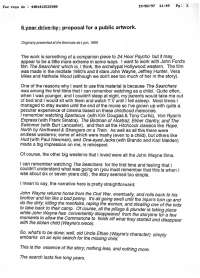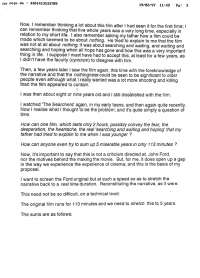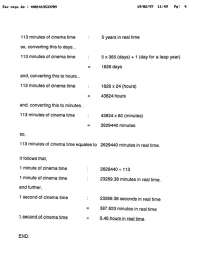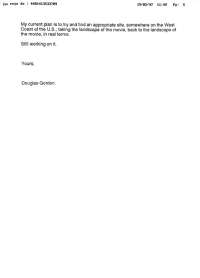Originally presented at the Biennale de Lyon, 1995.
The work is something of a companion piece to 24 Hour Psycho but it may, appear to be a little more extreme in some ways. I want to work with John Ford's film The Searchers which is, I think, the archetypal Hollywood western. The film was made in the mid/late 1950's and it stars John Wayne, Jeffrey Hunter, Vera Miles and Nathalie Wood (although we don't see too much of her in the story).
One of the reasons why I want to use this material is because The Searchers was among the first films that I can remember watching as a child. Quite often, when I was younger, and I couldn't sleep at night, my parents would take me out of bed and I would sit with them and watch T.V until I fell asleep. Most times I managed to stay awake until the end of the movie so I've grown up with quite a peculiar experience of cinema based on these childhood memories. I remember watching Spartacus (with Kirk Douglas & Tony Curtis), Von Ryan's Express (with Frank Sinatra), The Birdman of Alcatraz, Elmer Gantry, and The Swimmer (with Burt Lancaster), and then all the Hitchcock classics like Rope, North by Northwest & Strangers on a Train. As well as all this there were endless westerns; some of which were trashy (even to a child), but others like Hud (with Paul Newman), and One-eyed Jacks (with Brando and Karl Malden) made a big impression on me, in retrospect.
Of course, the other big westerns that I loved were all the John Wayne films.
I can remember watching The Searchers for the first time and feeling that I couldn't understand what was going on (you must remember that this is when I was about six or seven years old) ; the story seemed too simple.
I mean to say, the narrative here is pretty straightforward;
John Wayne returns home from the Civil War, eventually, and rolls back to his brother and kin like a bad penny. It's all going swell until the lnjun's turn up and do the dirty; killing the menfolks, raping the women, and stealing one of the kids to take back to their camp. Of course, all the pillage & plunder is taking place while John Wayne has conveniently disappeared from the storyline for a few moments to allow the Commanche to finish off what they started and disappear with the stolen child (Wayne's niece).
So, what's to be done; well, old Uncle.Ethan (Wayne's character) simply embarks on an epic search for the missing child.
This is the essence of the story; nothing less, and nothing more.
The search lasts five long years.
Now, I remember thinking a lot about this film after I had seen it for the first time; I can remember thinking that five whole years was a very long time, especially in relation to my short life. I also remember asking my father how a film could be made which seemed to be about nothing. He tried to explain to me that the film was not at all about nothing; it was about searching and waiting, and waiting and searching and hoping when all hope has gone and how this was a very important thing in life. I suppose I must have had to accept this, at least for a few years, as I didn't have the faculty (cynicism) to disagree with him.
Then, a few years later I saw the film again; this time with the foreknowledge of the narrative and that the nothingness could be seen to be significant to older people even although what I really wanted was a lot more shooting and killing than the film appeared to contain.
I was then about eight or nine years old and I still dissatisfied with the film.
I watched The Searchers again, in my early teens, and then again quite recently. Now I realise what I thought to be the problem; and it's quite simply a question of time.
How can one film, which lasts only 2 hours, possibly convey the tear, the desperation, the heartache, the real 'searching and waiting and hoping' that my father had tried to explain to me when I was younger?
How can anyone even try to sum up 5 miserable years in only 113 minutes?
Now, it's important to say that this is not a criticism directed at, John Ford, nor the motives behind the making the movie. But, for me, it does open up a gap in the way we experience the experience of cinema; and this is the basis of my proposal.
I want to screen the Ford original but at such a speed so as to stretch the narrative back to a real time duration. Reconstituting the narrative, as it were.
This need not be so difficult, on a technical level.
The original film runs for 113 minutes and we need to stretch this to 5 years.
The sums are as follows;
(pg. 4 diagram)
My current plan is to try and find an appropriate site, somewhere on the West Coast at the U.S.; taking the landscape of the movie, back to the landscape of the movie, in real terms.
Still working on it,
Yours,
Douglas Gordon.
Originally presented at the Biennale de Lyon, 1995.
The work is something of a companion piece to 24 Hour Psycho but it may, appear to be a little more extreme in some ways. I want to work with John Ford's film The Searchers which is, I think, the archetypal Hollywood western. The film was made in the mid/late 1950's and it stars John Wayne, Jeffrey Hunter, Vera Miles and Nathalie Wood (although we don't see too much of her in the story).
One of the reasons why I want to use this material is because The Searchers was among the first films that I can remember watching as a child. Quite often, when I was younger, and I couldn't sleep at night, my parents would take me out of bed and I would sit with them and watch T.V until I fell asleep. Most times I managed to stay awake until the end of the movie so I've grown up with quite a peculiar experience of cinema based on these childhood memories. I remember watching Spartacus (with Kirk Douglas & Tony Curtis), Von Ryan's Express (with Frank Sinatra), The Birdman of Alcatraz, Elmer Gantry, and The Swimmer (with Burt Lancaster), and then all the Hitchcock classics like Rope, North by Northwest & Strangers on a Train. As well as all this there were endless westerns; some of which were trashy (even to a child), but others like Hud (with Paul Newman), and One-eyed Jacks (with Brando and Karl Malden) made a big impression on me, in retrospect.
Of course, the other big westerns that I loved were all the John Wayne films.
I can remember watching The Searchers for the first time and feeling that I couldn't understand what was going on (you must remember that this is when I was about six or seven years old) ; the story seemed too simple.
I mean to say, the narrative here is pretty straightforward;
John Wayne returns home from the Civil War, eventually, and rolls back to his brother and kin like a bad penny. It's all going swell until the lnjun's turn up and do the dirty; killing the menfolks, raping the women, and stealing one of the kids to take back to their camp. Of course, all the pillage & plunder is taking place while John Wayne has conveniently disappeared from the storyline for a few moments to allow the Commanche to finish off what they started and disappear with the stolen child (Wayne's niece).
So, what's to be done; well, old Uncle.Ethan (Wayne's character) simply embarks on an epic search for the missing child.
This is the essence of the story; nothing less, and nothing more.
The search lasts five long years.
Now, I remember thinking a lot about this film after I had seen it for the first time; I can remember thinking that five whole years was a very long time, especially in relation to my short life. I also remember asking my father how a film could be made which seemed to be about nothing. He tried to explain to me that the film was not at all about nothing; it was about searching and waiting, and waiting and searching and hoping when all hope has gone and how this was a very important thing in life. I suppose I must have had to accept this, at least for a few years, as I didn't have the faculty (cynicism) to disagree with him.
Then, a few years later I saw the film again; this time with the foreknowledge of the narrative and that the nothingness could be seen to be significant to older people even although what I really wanted was a lot more shooting and killing than the film appeared to contain.
I was then about eight or nine years old and I still dissatisfied with the film.
I watched The Searchers again, in my early teens, and then again quite recently. Now I realise what I thought to be the problem; and it's quite simply a question of time.
How can one film, which lasts only 2 hours, possibly convey the tear, the desperation, the heartache, the real 'searching and waiting and hoping' that my father had tried to explain to me when I was younger?
How can anyone even try to sum up 5 miserable years in only 113 minutes?
Now, it's important to say that this is not a criticism directed at, John Ford, nor the motives behind the making the movie. But, for me, it does open up a gap in the way we experience the experience of cinema; and this is the basis of my proposal.
I want to screen the Ford original but at such a speed so as to stretch the narrative back to a real time duration. Reconstituting the narrative, as it were.
This need not be so difficult, on a technical level.
The original film runs for 113 minutes and we need to stretch this to 5 years.
The sums are as follows;
(pg. 4 diagram)
My current plan is to try and find an appropriate site, somewhere on the West Coast at the U.S.; taking the landscape of the movie, back to the landscape of the movie, in real terms.
Still working on it,
Yours,
Douglas Gordon.



